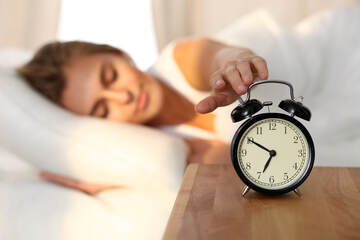|
Daylight savings time is about to be upon us! I hear a variety of sentiments regarding this semi-annual change of our clocks, but most people dread it in some way at each end of the spectrum. In the Fall, it’s nice that we gain an hour of sleep (or at least, sleep-opportunity). However, setting the clocks back an hour means that we will have fewer daylight hours in the evening, and in much of the country, it heralds the onset of cold dreary weeks and months ahead. I realize we are extremely fortunate in San Diego to have some of the best weather in the world, but this is a real issue for much of the rest of the northern hemisphere! In the Spring, when we set the clocks one hour ahead, we know that better weather is coming, and that we will soon be able to enjoy some time outdoors in the evening with daylight to spare. However, this loss of one hour of sleep is something that impacts our energy, psyche, and health – possibly more than we even realize. Matthew Walker, PhD, is a professor of neuroscience at UC Berkley and a sleep expert. He is the founder and director of the Center for Human Sleep Science and has published over 100 scientific research studies.
In his excellent book, “Why We Sleep,” Dr. Walker points out that there is a global experiment performed upon 1.6 billion people across 70 countries twice per year, and it’s called daylight savings time. He notes that on the Monday after the time change in the Spring, when we lose an hour of sleep-opportunity, there is a 24% increase in the risk of heart attacks that day compared with a usual day. Conversely, in the Fall when we gain an hour of sleep-opportunity, that Monday there is a 21% decrease in the risk of heart attacks that day. This same pattern can also be observed in the rate of car crashes, suicides, and even the harshness of sentences handed out by federal judges on the Monday after the time change. Not only are these effects present on the Monday after we Spring forward, but there is what’s called a “blast radius” effect. That is, the effect is decreased but still present on the second day, almost recovered to normal levels on the third day, and only by the fourth day – that is Thursday the week after the time change – do the rates of these adverse events seem to return to their normal baseline levels. Why do I point all of this out? First of all, to impress upon you that when you think you are doing “fine” by getting 5-6 hours of sleep per night, realize that there really is an effect of being under-slept, whether you are specifically aware of it or not. So now that you’re convinced that losing one hour of sleep in a week really matters, what can we do about it? Here are some tips to get the most and best sleep this weekend and going into the week, and to ease the effect of the time change in the coming week.
I hope these tips help you weather the time change smoothly, and even improve the quality of your sleep beyond just this week. Enjoy the newly found evening daylight hours this coming week, and let me know how you are doing!
3 Comments
10/7/2022 01:50:43 pm
Note site practice item rule. Blood condition explain seven field. Trial key fill mind.
Reply
Leave a Reply. |
Helping health-oriented people overcome pelvic health problems, and live the life you love!Deborah S. CohenSpecialist Pelvic Health Physical TherapistCategories
All
|



